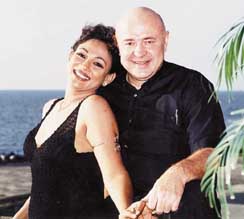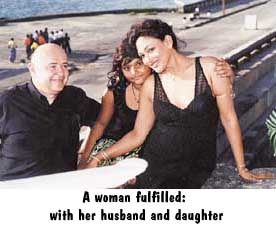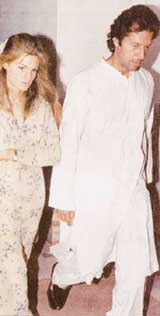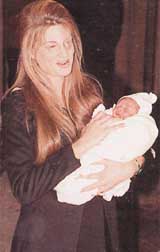



![]()
Diana, " A candle in the wind" which blew out far too early, was a person loved, respected, honoured and admired by millions of people around the world. A heart filled with love, kindness, compassion and joy was lost from the face of this earth forever with her untimely death. The Princess of Wales was killed in a car crash in Paris on the 30th of August. Her companion Dodi Al Fayed was also killed in the crash. It is believed that the princess and Dodi left after dinner from the hotel with the driver and a bodyguard, when photographers pursued them on motorbikes. When the car accelerated to escape the eye of the camera it crashed. The driver and Dodi died on the spot. Diana, was taken to the hospital where doctors attempted desperately without success to save the princess' life.
Her death put the people of England and around the world in shock. People placed millions of floral tributes near the hospital she died, near Buckingham Palace, Kensington Palace and St. James' Palace to express their grief. Many were devastated with this tragedy. Diana was only thirty six years old when she died. She married Prince Charles in 1981 and gave birth to two sons, William and Harry. The people called her " The Queen of Hearts," because she was a kind and warm human being. She touched the lives of the people who needed to be touched and helped them to get over their illnesses - people suffering from AIDS, cancer and land mine victims were the main focus of her attention.
Diana's brother Earl Spencer, blames the " Paparazzi " who was mostly interested in Diana's private life. He said the ever-present paparazzi helped to bring her down. And he also mentioned that Diana needed no royal title to do her charity work just as she did before.
Diana's funeral was held on September 06th at Westminster Abbey. Elton John changed the words of his old song " Candle in the wind" to make it more appropriate to " The Rose of England " they had lost. Millions of people all around the world joined in the funeral on TV and radio. They all felt they had lost someone they knew very well, who was close to their hearts. Even the people who didn't really know her felt they did because she was such an open person.
Her life though short was very valuable. The world could really do with a lot more Diana's. She was " A shooting star " among other stars, and her whispers to the people in pain will always vibrate in their hearts. I know that I'm not alone in saying that she really belongs to heaven, and may her warm heart and soul always rest in peace.
She may count two decades in Sinhala cinema, but Geetha Kumarasinghe believes she still has many roles to play in life and on the silver screen
She seems to effortlessly retain the glamorous
image that first brought her fame on the silver screen two decades ago.
But ask Geetha Kumarasinghe about it and she will tell you that she did
not expect to become a symbol of glamour. Her gentle rebellion brought
her both fame and fortune at the tender age of 16, a rural beauty pageant
transforming her entire life. Before  she
could grasp the situation, she had signed too many film contracts, and
was effectively propelled into the world of tinsel, destined for dizzy
heights in cinema.
she
could grasp the situation, she had signed too many film contracts, and
was effectively propelled into the world of tinsel, destined for dizzy
heights in cinema.
Yet she has no pretensions about what goes to make a celebrity. "I think it is necessary that an actor or actress retain that star appeal. That is how you are remembered by the people, and it is beneficial to always look good, especially in this industry. Cinema is make believe, so one must look the part," she says, flashing her famous smile.
There are no traces of the village girl left in her any more. She looks every inch the confident actress and business woman. Clad in a white jogging suit, hair tied in a fly away pony tail with no make up at all, she has the girl next door look despite the subtle aura of sophistication.
"This is what I really am. Despite the image I present, there still lies a lot of village girl and a vulnerable spirit still struggling to take wing," she quips with an eloquent shrug.
Geetha Kumarasinghe was launched as an actress by 'Lassana Kella' way back in 1975, and there has been no turning back since then.
Attributing her success to her desire to be 'rich and famous", Geetha says that through a self-built career, forged at times with difficulty, she has learnt to depend only on herself.
"I am a self made person, who was educated in the school of life. Sometimes, I have found myself out of depth, and sometimes things have been smooth. Amidst all this, my career flourished because I took cinema seriously and made it my whole life. My burdens became lighter, as I found a supportive husband who cared enough to let me do my own thing and be my own person," she says gratefully.
From the very outset, she was lucky to be cast both in artistic and commercial movies, a balancing act in which many others have failed. Though unintentional then, in retrospect Geetha is happy that she has had the best of both worlds.
"It is important that one gets exposed to both types during the early years in one's career. The requirements of the two types differ. In commercials, the priority is to provide mild entertainment. Artistic movies are more intense. But our commercial films are so stereotyped and lacking appeal, I have wowed never to sign a single contract for a commercial. I am fed up with doing the same routine wearing some horrible clothes. The directors must understand the necessity to improve this side of the industry if they want to attract film goers. The survival of the local film industry depends on this," says Geetha reflectively.
After two decades as an actress, she believes that the turning point
in her career was 'Siribo Aiya.' She feels the audiences  accepted
her as one of their own after her portrayal in 'Palama Yata', one of her
favourite roles.
accepted
her as one of their own after her portrayal in 'Palama Yata', one of her
favourite roles.
"I have come to a stage where I can afford to be choosy, and I choose to reject characters in which I encounter no challenge. I have signed only two film contracts for this year. One is symbolic of an innocent and large-hearted village woman. The other is about a woman falling in love again with her former boy friend at the ripe age of sixty. The second was my concept, and what I seek to tell audiences is that love should not have those conventional barriers. I believe that people have the right to love at any age without becoming ridiculed for that."
Geetha Kumarasinghe claims to have no regrets of having become an actress at all, except that stardom so dramatically changed her life that higher education eluded her. But she finds consolation in the fact that she was able to become independent, creative and use her assets to help other people. Smilingly she admits that she wanted to break away from the village life which had everything mapped out for her- marriage in the early twenties and an unadventurous life style with many children and no achievements for herself.
"I have broken the barriers of orthodox upbringing to become a star, and am enjoying my celebrity status. I am a firm believer that we must paint on a larger canvas than what most people do," says a reflective Geetha.
She admits being pained by the plight of the domestic cinema, and attributes it to two causes. Having produced several box office hits that were in fact artistic movies, she believes that a concentrated effort by all film makers to pool their resources and push it out of the doldrums is important. It was equally important to give secondary importance to Hindi movies and actors, she feels.
"It is alarming to watch the new movie trends. People are so fascinated with things Indian that Sri Lanka will soon appear as a part of India and not a separate country. Television has created bigger audiences for Hindi movies and made local cinema less significant. It is only by making good films that the situation could be improved," she says.
Geetha is quick to point out the setbacks our cinema faces- the lack of funds which make directors work on a shoe-string budget, the reluctance to introduce new people and the unwillingness to invest in the industry and its people.
"We must evolve a scheme where the uncertainty would end. I think all of us must take risks and do things for the industry we all love. Some of the movies are full of vulgarity and sex. Subtlety is an art with which one can do wonders. 'Palama Yata' had it, 'Kama Sutra' has it. But it should be artistically presented."
Likening cinema to meditation, Geetha says that it requires concentration and commitment. Due to this quality, teledramas have no lasting appeal. The characters are forgotten in a few years. Only cinema can create stars and leave a lasting impression, she believes.
Nothing seems to deter her in life, she claims. When we query whether nothing scares the self-possessed actress, she smiles wistfully replying that life itself scared her, and death which would lead to parting with her loved ones.
"Not even the advancing years dampen my spirit. To a lot of women, life is over at 40 but not for me. I want to live life to the fullest. Every day is a new adventure from which I must extract maximum. Like any other mother, I worry about my daughter and feel low when things do not work exactly my way.
"But I do not map out things for my daughter. Her tastes are similar to that of my husband, and she has little appreciation for things Eastern. I am not the kind of mother who wants to realize my ambitions through her, for she must have the right to decide for herself.
I am only glad that I have her loving presence in my life, for that is what finally made me the fulfilled woman that I am- a mother first and then everything else.
Every day, she dreams a different dream , and her goals and dream portrayals also change. Though she likes many of the characters portrayed by her, she believes her best performance is yet to come.
"I would give my life for a portrayal like Madonna's as Eva Peron in Evita. Playing Rukmani Devi would also appeal tremendously to me," she says with a smile. But there are things she is still scared to venture forth into-like directing a film and directing her own self. Meanwhile, she continuesto play the heroine and produce films.
"Fate has added much to my bouquet, and I want to make my own contribution to this world. It is only natural that I choose cinema as my vehicle to achieve my objective," says Geetha, flashing her mischievous smile again.
Ramani Fernando Salons handled Geetha's hair and make-up for these photographs by Mettasenaa
IMRAN KHAN, the former Pakistan cricket captain has admitted that his political career as leader of a party that failed to win a single seat in elections earlier this year has put a strain on his marriage to Jemima, daughter of the late financier Sir James Goldsmith.
"It has been pretty tough for her,'' he said last month. "I am not spending as much time at home as I should. To say it has been easy would be far from the truth. One thing I don't like about politics is that it is very tough on home life."
When Jemima Goldsmith married Imran at a register office in Richmond,
Southwest London, 21/2 years ago, it was hailed as  the
society wedding of the year. Imran said at the time he had no plans to
enter politics. However, since launching an anti-corruption campaign and
running for office last February at the head of the Movement for Justice
party, he has been subjected to a relentless smear campaign, focused on
his former playboy lifestyle.
the
society wedding of the year. Imran said at the time he had no plans to
enter politics. However, since launching an anti-corruption campaign and
running for office last February at the head of the Movement for Justice
party, he has been subjected to a relentless smear campaign, focused on
his former playboy lifestyle.
"It put a lot of stress on the marriage because for Jemima to come out to Pakistan, it's a huge change,'' he said. ''She finds it difficult but there are very commendable qualities in her. She tries very hard.''
Friends of the couple say that since her father's death in July, Jemima has spent an increasing amount of time away from the home in Lahore that she shares with Imran's extended family — a lifestyle she has nevertheless described as "supremely civilised."
While Jemima has returned to England for Christmas with Sulaiman, the couple' s one-year-old son, Imran has so far remained at home to reorganise his struggling party. "I have some work to do here," he said.
He said he hoped he and Jemima would have more children. "At least one or two more. She feels the same as me,'' said Imran. "We both love our son and we would love to have more."
He acknowledged that as he was forced to spend many hours in smoke-filled rooms discussing the future with members of his party, economists and political experts, his wife was left increasingly to her own devices. However, he said she did not complain about the pressures of his political career.
Imran plans to spend more time in Islamabad, where his party has opened new offices. He will divide his time between the house in Lahore and a flat in Islamabad. ''It's a bit difficult to stay in Islamabad with your wife, son, maid and driver,'' he added.
 Since
moving to Pakistan, Jemima has adopted Islamic dress and taken the name
Haiqa. She has also written articles about the virtues of converting to
Islam, saying she was "more than willing to forgo the transient pleasures
derived from alcohol and nightclubs."
Since
moving to Pakistan, Jemima has adopted Islamic dress and taken the name
Haiqa. She has also written articles about the virtues of converting to
Islam, saying she was "more than willing to forgo the transient pleasures
derived from alcohol and nightclubs."
But the 23-year-old former Bristol undergraduate has come under pressure from the Pakistan media. She has been accused of being part of ''a Jewish conspiracy'' because her paternal grandfather was Jewish, even though she was baptised a Christian.
"It is more difficult for her than me because at least this is my home," said Imran. "It's much tougher for her. She has made the greatest sacrifice.''
Speaking before she left for London, Jemima, who has become involved in fundraising for the Shaukat Khanum cancer hospital founded by Imran in memory of his mother, said of her life in Lahore: "I do feel comfortable here because I live with Imran's family.
"I have hardly seen any foreigners at all in the past 21/2 years," she said. "It's pretty much home now.''
Despite its failure at the polls, Khan's Movement for Justice has succeeded to some extent in setting Pakistan' s political agenda by exposing corruption since Nawaz Sharif, leader of the Pakistan Muslim League, swept to power.
He believes a political crisis prompted by a dispute between the judiciary, president and parliament — which has paralysed decision-making — offers new opportunities for his party to progress.
However, his political inexperience — he even forgot to register himself to vote in the general election — is widely thought to have undermined the party's credibility. It has very little grassroots support and several senior members have left recently in frustration.
''He does not have leadership qualities. He has no warmth as a politician. He quickly changes his mind," said one former colleague. Another former supporter said: ''In politics you have to do work at the grassroots. But he is relying only on good speeches, his past and friends.'' Such criticism and the strains on his family life have not deterred Imran from pursuing political power, however.
"It is a life which does not suit me, nor do I like it, in the sense that basically I am a private person. I love being with my family, with my wife and son,'' he said.
"But I don't believe that you sit back and watch Pakistan become a banana republic.''
Continue to Mirror Magazine page 4 * Junior Times
Return to Mirror Magazine contents
![]()
Please send your comments and suggestions on this web site to
info@suntimes.is.lk or to
webmaster@infolabs.is.lk